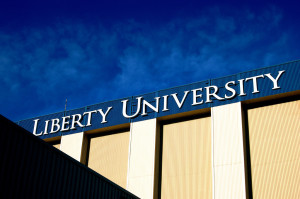
Yesterday morning, Texas Governor and current GOP presidential front-runner Rick Perry spoke about his spiritual history in an address to the students of Liberty University, a Christian college in Lynchburg, Virginia which was founded 40 years ago by Jerry Falwell. He took care to emphasize the depth of his Christian faith and was downright self-deprecating about his intellectual background, joking that he graduated “in the top 10 of [his] graduating class — of 13.” He added that his dreams of becoming a veterinarian were dashed after he flunked organic chemistry.
Perry didn’t allow his audience to doubt his religious credentials, however. “As spiritual beings, we are meant to live in relationship with our creator and with one another,” he said. “And the happiest moments of every experience are when I am in communion with God and in community with others.”
It’s common for Republican candidates to speak at Liberty; Michele Bachmann will travel to Lynchburg later this month, bringing the total of Republican contenders who have spoken at the college to five. And while his profession of faith may not shield Perry from his opponents’ criticism during primary debates (on Monday night, Perry was attacked for two controversial policies: providing in-state college tuition to the children of illegal immigrants and signing an executive order which required Texas’ girls to get the HPV vaccine), it’s a smart move in terms of his electability.
According to a survey from Public Religion Research Institute conducted in July, more than 7-in-10 Republicans (71%) and those identifying with the Tea Party (72%) say it is somewhat or very important that a presidential candidate have strong religious beliefs. Given the numbers, this speech could boost Perry’s favorability ratings – which are already high – even more. The fact that Falwell’s university is becoming established as an expected pilgrimage stop along the campaign trail shows that plainly, Republican candidates are well aware that this dynamic exists among their base.